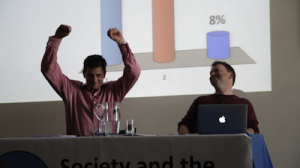 Those of us involved in genomics research spend a lot of time thinking about how scientific and technological developments might influence personal genomics. For instance, does the falling cost of sequencing mean that medically useful personal genomics will likely be based on sequence rather than genotype data? (Yes.)
Those of us involved in genomics research spend a lot of time thinking about how scientific and technological developments might influence personal genomics. For instance, does the falling cost of sequencing mean that medically useful personal genomics will likely be based on sequence rather than genotype data? (Yes.)
At the Sanger Institute we’ve recently launched (along with our friends at EBI) a project to look more deeply at a question which is less often on the lips of genomics boffins: “How does genomics affect as us people, both individually and in communities?” Because of the obvious resonance with Genomes Unzipped it should come as no surprise that many of us (including myself, Daniel and Luke) have been intimately involved in this initiative.
The actual line-up of events has been diverse, and a lot of fun. We’ve had two excellent debates, including one between Ewan Birney and Paul Flicek (pictured) on the value, or lack thereof, of celebrity genomes (covered in more detail here). A poet, Fiona Sampson, spent some time on campus and we’ve commissioned a book of poetry from her. This one raised some eyebrows, but I have to say that talking to her has given me some brand new ways of thinking about my own work. We’re also working on a more interactive project in the hope of making personal genomics a bit more personal. Stay tuned.








 RSS
RSS Twitter
Twitter
I have written about this very subject in my own blog as well. I invite your readers to have a look:
http://www.michaelwosnick.com/as-our-dna-defines-us-science-outpaces-ethics/
http://www.michaelwosnick.com/welcome-to-the-world-of-genomics-part-three/
Wait, is that Ewan and Paul in the pic? or just Paul??
I like that a conversation w/a poet had some impact on you :) So cool!! Looking forward to hearing more!
Although it appears that third generation sequencing could allow inexpensive technology for sequencing an entire genome, there still remains the next step identifying what the genes do. Proteomics will also have a role here.